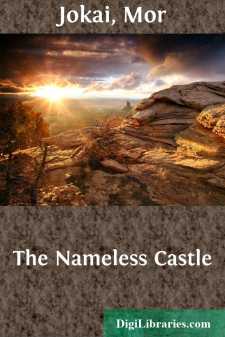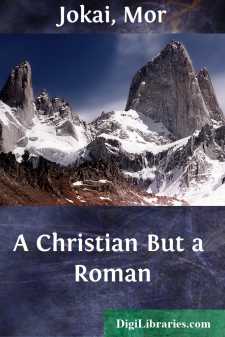Categories
- Antiques & Collectibles 13
- Architecture 36
- Art 48
- Bibles 22
- Biography & Autobiography 813
- Body, Mind & Spirit 142
- Business & Economics 28
- Children's Books 17
- Children's Fiction 14
- Computers 4
- Cooking 94
- Crafts & Hobbies 4
- Drama 346
- Education 46
- Family & Relationships 57
- Fiction 11829
- Games 19
- Gardening 17
- Health & Fitness 34
- History 1377
- House & Home 1
- Humor 147
- Juvenile Fiction 1873
- Juvenile Nonfiction 202
- Language Arts & Disciplines 88
- Law 16
- Literary Collections 686
- Literary Criticism 179
- Mathematics 13
- Medical 41
- Music 40
- Nature 179
- Non-Classifiable 1768
- Performing Arts 7
- Periodicals 1453
- Philosophy 64
- Photography 2
- Poetry 896
- Political Science 203
- Psychology 42
- Reference 154
- Religion 513
- Science 126
- Self-Help 84
- Social Science 81
- Sports & Recreation 34
- Study Aids 3
- Technology & Engineering 59
- Transportation 23
- Travel 463
- True Crime 29
Timar's Two Worlds
by: Mor Jokai
Description:
Excerpt
CHAPTER I.
THE IRON GATE.
A mountain-chain, pierced through from base to summit—a gorge four miles in length, walled in by lofty precipices; between their dizzy heights the giant stream of the Old World, the Danube.
Did the pressure of this mass of water force a passage for itself, or was the rock riven by subterranean fire? Did Neptune or Vulcan, or both together, execute this supernatural work, which the iron-clad hand of man scarce can emulate in these days of competition with divine achievements?
Of the rule of the one deity traces are visible on the heights of Fruska Gora in the fossil sea-shells strewn around, and in Veterani's cave with its petrified relics of saurian monsters of the deep; of the other god, the basalt of Piatra Detonata bears witness. While the man of the iron hand is revealed by long galleries hewn in the rock, a vaulted road, the ruined piers of an immense bridge, the tablets sculptured in bas-relief on the face of the cliff, and by a channel two hundred feet wide, hollowed in the bed of the river, through which the largest ships may pass.
The Iron Gate has a history of two thousand years. Four nations—Romans, Turks, Roumanians and Hungarians, have each in turn given it a different name.
We seem to approach a temple built by giants, with rocky pillars, towering columns, and wonderful colossi on its lofty frieze, stretching out in a perspective of four miles, and, as it winds, discovering new domes with other groups of natural masonry, and other wondrous forms. One wall is smooth as polished granite, red and white veins zigzagging across it like mysterious characters in the handwriting of God. In another place the whole face is rusty brown, as if of solid iron. Here and there the oblique strata suggest the daring architecture of the Titans. At the next turn we are met by the portal of a Gothic cathedral, with its pointed gables, its clustered basaltic columns. Out of the dingy wall shines now and again a golden speck like a glimpse of the Ark of the Covenant—there sulphur blooms, the ore-flower. But living blossoms also deck the crags. From the crevices of the cornice hang green festoons. These are great foliage-trees and pines, whose dark masses are interspersed with frost-flecked garlands of red and gold.
Now and then the mouth of some valley makes a break in the endless, dizzy precipice, and allows a peep into a hidden paradise untrodden by man.
Here between two cliffs lies a deep shadow, and into this twilight shines like a fairy world the picture of a sunny vale, with a forest of wild vines, whose small red clusters lend color to the trees, and whose bright leaves weave a carpet below. No human dwelling is visible; a clear stream winds along, from which deer drink fearlessly; then the brook throws its silver ribbon over the edge of the cliff. Thousands pass by the valley, and each one asks himself who lives there.
Then follows another temple more huge and awful than the first; the towering walls drawing closer by three hundred yards and soaring three thousand feet into the sky.
That projecting needle at the top is the "Gropa lui Petro," the grave of St. Peter; the two gigantic forms on either side are his apostolic companions; yonder monster opposite is the "Babile," and the one which closes the vista is the "Golumbaczka Mali" or Dove-rock; while the gray pinnacle which towers above is the high Robbers' Peak, "Rasbojnik Beliki."
Between these walls flows the Danube in its rocky bed. The mighty mother-stream, accustomed far above on the Hungarian plains to flow with majestic quiet in a bed three miles wide, to caress the overhanging willows, to look on blooming meadows and play with chattering mills, is here confined in a pass only a hundred and fifty fathoms in width.
With what rage it rushes through! He who traveled with it before recognizes it no longer; the grisly giant is rejuvenated into heroic youth. Its waves leap along the stony bed, from which sometimes a great bowlder projects like a witch's altar, the huge "Babagay," the crowned "Kassan." On this it bursts with majestic fury, roaring round it with swirls which hollow deep abysses in the bottom; thence it rushes, hissing and seething, across the slabs of rock which stretch obliquely from side to side of the channel. In many places it has already mastered the obstacles which barred its way, and flows foaming through the open breach. There, it has burrowed beneath the wall of the ravine, and by its continuous current has washed out a channel below the overhanging rock. Here, it has carved islands out of the stubborn granite, new creations, to be found on no chart, overgrown with wild bushes. They belong to no state—neither Hungary, Turkey, nor Servia; they are ownerless, nameless, subject to no tribute, outside the world. And there again it has carried away an island, with all its shrubs, trees, huts, and wiped it from the map.
The rock and islets divide the stream, which between Ogradina and Plesvissovicza has a speed of ten miles an hour, into many arms; and the sailor has need to study these intricate and narrow passages, for there is but one deep-water channel through the rocky bed—in-shore none but the smallest boats can float....












